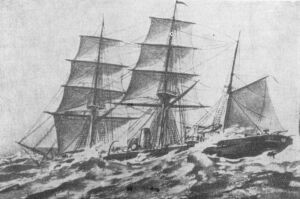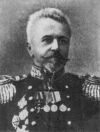THE CRUISER “RAZBOINIK” IN AUSTRALIA
 The cruiser “Razboinik” (on the photo to the
left) sailed off on
The cruiser “Razboinik” (on the photo to the
left) sailed off on

A special program of collection of data on the social-economic and demographic
situation in the city was designed for the crew. The commander of the cruiser
put the obtained data into a system and compiled a report which is offered
to your attention after some reduction. It contains information about the
stay in the Gulf of Exmouth, a description of
REPORT
OF THE COMMANDER OF THE 2nd RANK CRUISER “RAZBOINIK”
On the fourth day of holidays, i.e., on the first working day, I used the stay at the excellent anchorage convenient in any regard for conducting of different kinds of drilling. It was a spacious anchorage with nothing to be entertained with, with right and stabile shore breezes, empty - all this tempted me to stay there for the fourth day in order to conduct some exercise feasible only at an anchorage. In the morning when the fresh breeze was still on I sent boats to sail, simultaneously two shields were set up - one was pyramidal for gun shooting, and another one for rifle shooting of the combat crew. They kept shooting in turn all day through till the sunset.
On the next say, 1st of April, I picked up the shields and at 10.30 a.m. under the sails raised the anchor and set off to Darwin. As we left the NW-Cape in distance the wind became quieter, so on the 3rd of April at 9 p.m. having becalmed I got up steam.
On the next day having got light wind pushing the cruiser at a speed of 2-4 knots set sails again. But this wind did not last long. This weather was quite typical for April when the SO-monsoon is not well set yet. In the evening of the same 3rd f April I got up steam and went on this way under the full calm to the Port of Darwin to where I arrived on the 8th of April at 3 p.m.
...During
our stay in Port Darwin all crew in turn was granted a leave. The officers
were also set free to go on shore for acquaintance with the city and the
country. The call in
I have honor
to report with pleasure that all officers from a junior to a senior related
zealously to implementation of the task given to them and due to that the
data was collected not only for the
The
There are only about 1500 people in the town…
out of them only 500 are Europeans, the rest are Chinese, Malaysians and
other red-skinned tribes. The Europeans occupy administration positions, and
the whole commerce is in the hands of the Chinese who also are the only laborers
in the area able to work in such heat for low wages. But now the Chinese
immigration is strongly inhibited by the general colonial legislation caused
as it is explained by wishes to lift salaries of the Europeans. The whole
area suffers from such prohibition, the works have stopped, as the Europeans
cannot work in this climate but the Chinese are not allowed in.
The trade has ceased as well as there is nothing
to export, the country does not produce anything. There
are two banks in the town, which seem to be subsidiaries of the major Australian
banks, but both of them are close to being shut and I could not get money
in either. The rail road goes from Palmerston to Pine Creek over 165 miles
but this road built for the money of the English mother country is a grandiose
but useless construction. It’s a narrow-gauge road and works only two times
a week. But the building for the rolling stock and 16 superb houses for servicemen
amaze by their grandiosity and uselessness. These
houses stay empty since the absence of European servicemen, the whole lot
of the rail-road workers are the Chinese which are not allowed to live in
these houses. Pine Creek – the furthermost point of the railroad is built
in the area of gold mining which is also in decline due to the lack of capital,
entrepreneurs and laborers…
The stay in Darwin turned out to be a very pleasant
time spending due to the exceptional courtesy and
obligingness of the resident who performed such a courtesy that he drove
me in his carriage and showed me all places of interest on many occasions,
honored me by lunch and ball and, finally, arranged a military dance of the
wilds – “karabora” for which the local savages
had been summoned in the yard of the Governor’s house. I from my side tried
to pay back with courtesy, arranged a major breakfast onboard of the cruiser
for which also invited his sisters. Actually the resident was not only courteous
but openly advised all possible information about the Australian colonies,
projects of the English Government and by the end supplied me with official
reference books about this province which I have an honor to enclose…
As to the food supplies Palmerston provides no conveniences part from that
that they are very expensive here… it has to be ordered beforehand and the
port would hardly be in a position to supply 3-4 ships simultaneously. This
place is especially short of vegetables. The fruit are abundant but one could
hardly say that they are cheap. Generally the gardening, trade and crafts
– everything is in the Chinese hands which make up about a thousand in the
port.
There is
no fresh water in the port and the locals use the rain water which is collected
in reservoirs during the rain season.
At
From
the book “Rossiiskie moryaki
I puteshestvenniki v Avstralii”
(The Russian seamen and travelers in
The West
Australian newspaper on the 2nd of June 1893 wrote about this visit: